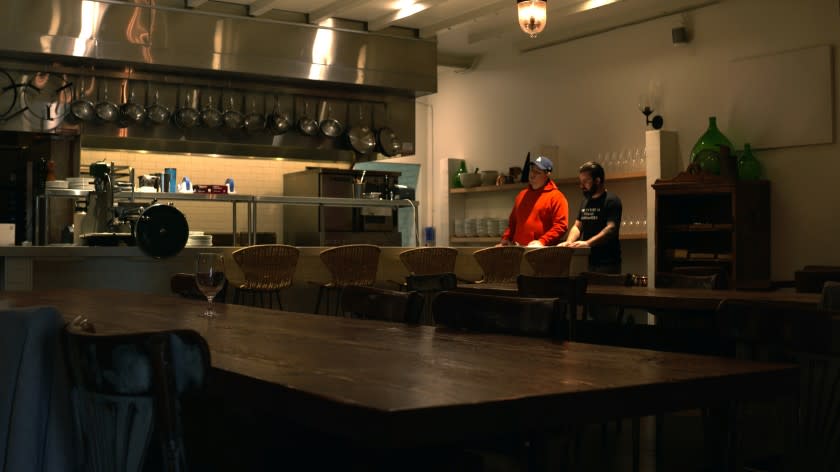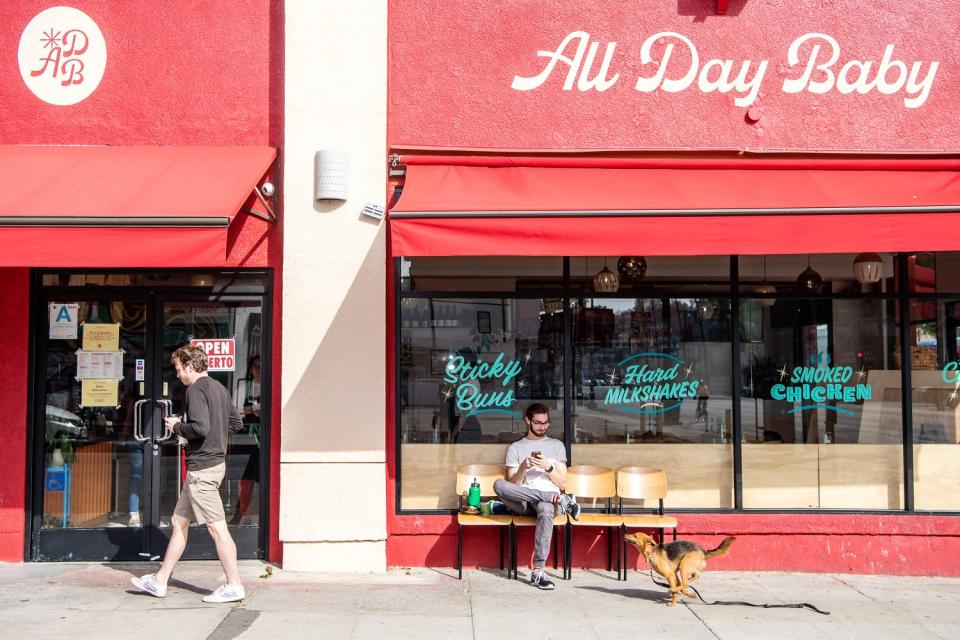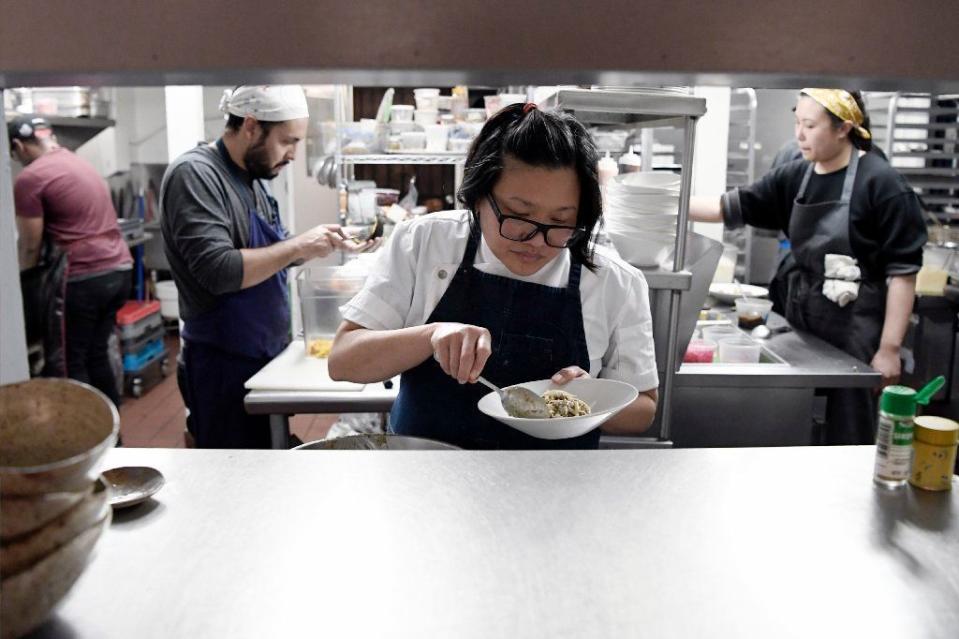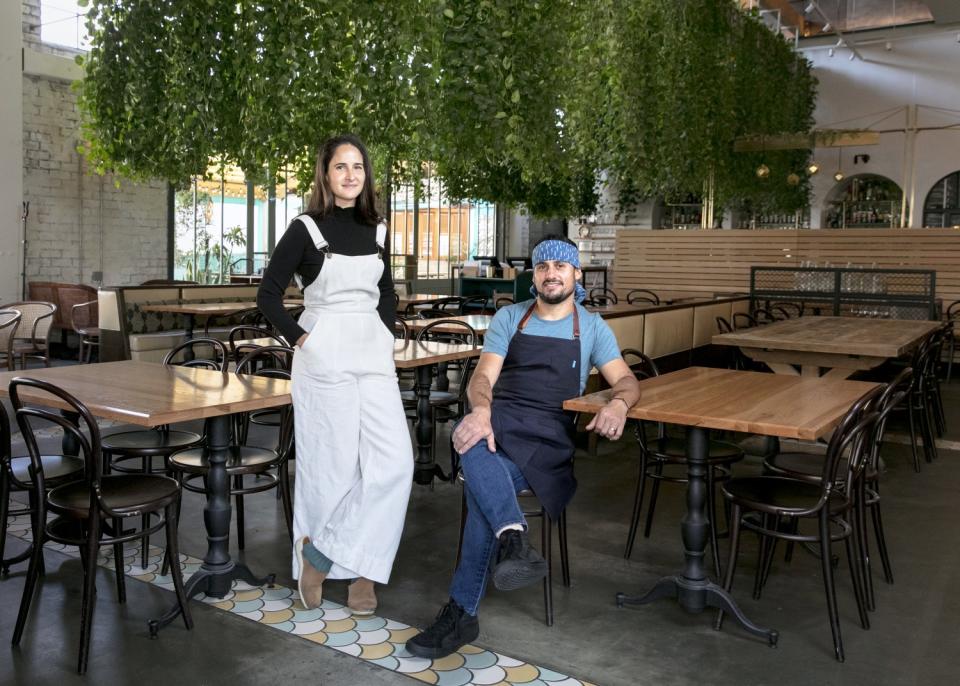$150 emergency taco kits, leftover pantry staples, merch: Chefs forced to reinvent amid restaurant shutdown

Even before the city ordered the shutdown of all restaurants in Los Angeles on Sunday night, Chad Colby had a game plan.
In recent days, as fears about the novel coronavirus swept through the country, the chef-owner of Antico had started experimenting with takeout at his Larchmont restaurant. He bought cartons and began selling his coveted house-made ice cream by the pint, and researched delivery apps to see which had the lowest fees. He’s contemplating creating cook-at-home dinner kits for families of four and on Tuesday announced a pick-up-only pop-up in the Antico space called Focacceria & Ice Cream.
“We’re going to try every possible way that we can to — at this point, not make money, at this point just to keep this business going,” Colby said of his 9-month-old restaurant. “Any income that we try to do right now isn’t even necessarily to break even, it's to sustain the losses that are going to be coming.”
With a strict mandate to close bars and restaurants (excluding takeout and delivery) until at least the end of March, the months ahead will test the resilience of chefs in unprecedented ways. Those who are able to pivot quickly and creatively will have the best chance of survival.
“Necessity is the mother of invention,” said Adam Weisblatt, owner of restaurant consulting company Last Word Hospitality and co-owner of Found Oyster in East Hollywood and Same Same in Silver Lake. “You have a creative industry facing a very unique challenge. And that is spurring a lot of people to come up with ideas and approaches that they would never otherwise consider.”
Chefs are used to stressful situations: long hours, razor-thin margins and the changing whims of the dining public. In the last few days, they’ve rallied: heavily pushing delivery and takeout as an obvious first step but also developing meal kits and taco "survival packs," encouraging people to buy gift cards and branded merchandise, boxing up unused inventory for sale, offering no-contact curbside pick-up and flipping restaurant spaces to become retail shops.
“In an attempt to be responsible and proactive, we are offering new delivery packages of heat-and-serve dishes,” chef Josef Centeno said on Instagram last week. On Tuesday, he released a to-go menu with items from his downtown restaurants Bäco Mercat, Orsa & Winston and Bar Ama and said he would soon sell sweatshirts that he was personally hand-dyeing.
"Right now I'm trying to figure out how to keep my chefs and managers working," he wrote. "They all have taken a pay cut and we have figured out an amount that can have them hopefully at least cover rent and buy basics while we get through this."
Many chefs, noticing that consumers are loading up at their local supermarkets, have begun selling kitchen essentials.
“The grocery stores are empty, so we’re packaging our pastas and bread to take home,” M. Georgina, the new downtown L.A. restaurant by Melissa Perello, said in a post along with pricing for dried mafaldine, spaghetti, casarecce and a house levain loaf.
Jeremy Fox of Birdie G's launched "The Sundries," a line of pantry staples that will be sold out of his Santa Monica restaurant Birdie G's, including ketchup, barbecue sauce, honey mustard and chicken stock; the chef said he would soon announce a full menu of prepared dishes, with curbside pick-up available.
Wes Avila of Guerrilla Tacos has even thrown in four rolls of toilet paper with his $150 "emergency taco kit," which also includes 5 pounds each of carne asada and roasted chicken, a quart each of red and green salsa, tortillas and 30 eggs. He called it a "true Angeleno survival pack" for "crazy and uncertain" times.
Given just four hours' advance notice of the impending shutdown, restaurant owners now find themselves with a surplus of inventory. At All Day Baby, which recently opened in Silver Lake, managing partner Lien Ta spent Monday organizing a “bodega” inside the restaurant to sell off unused product; the one-day fire sale on Tuesday included smoked meats, flats of eggs, bread, sauces, brownies, strawberries and "tons of other produce," and "wine, all the bottles."

Will it be enough? A lot depends on how long the shutdown lasts, and how consumers respond in the meantime.
"It’s hard to know how these moves will go," Weisblatt said. "So much is up in the air.”
And changing rapidly. On Monday, Los Angeles County followed the city’s lead by ordering the temporary closure of all restaurants and bars. Chefs said the sudden shifts mean constant reevaluation and adjustments; many have already thrown in the towel on takeout and delivery, finding it not financially feasible.
Last week, Kismet began making its regular menu available for takeout along with containers of chicken broth and house-made labneh. By Monday afternoon, the Los Feliz restaurant announced it would temporarily close. (Its sister restaurant, Kismet Rotisserie, will remain open for takeout and delivery, and will start selling produce boxes for $40 on Wednesday.)
Other restaurants that initially tried their hand at takeout but also reversed course in a matter of days: Bon Temps, Lincoln Carson's downtown restaurant, which announced Monday evening that it would "be ceasing all operations indefinitely," and Otium, Tim Hollingsworth's restaurant nearby, which said it would keep paying employees' health insurance "for as long as we're able."
Meanwhile, Minh Phan decided to completely transition Porridge + Puffs, her Historic Filipinotown restaurant, into a “collaborative provision shop” that is set to open Thursday. Customers will be able to pick up items from the store or have them delivered; an online store is also in the works. Products will include most of Porridge + Puffs’ menu, as well as packaged foods and self-care products.

“I cried a lot today,” Phan said in an email on Sunday night. “I crunched numbers a zillion ways. With my personal savings, I will pay our team as long as I can or as long as it takes for us to creatively turn this ship around.”
Clark Street Bread is also touting retail offerings. The bakery set up an e-commerce section of its website on Monday to sell sweatshirts, T-shirts and gift cards — “other ways to help your small local businesses.”
Some chefs worry that those efforts, no matter how innovative or aggressive, won't come close to offsetting lost dining room revenue.
“A lot of restaurants aren’t financially prepared for this: We’re prepared to work harder, we’re prepared to get through hard times, but we’re not prepared for nothing,” said Genevieve Gergis, co-owner of Bestia and Bavel. Even before the closures, the two perpetually packed downtown restaurants hadn't "made profits for a week.”

“We’re scrambling with numbers to see how far we can stretch it,” she said. “All our overhead is a huge expense. Across both restaurants we serve 1,000 people a day. Our health insurance is $60,000 per month for our employees. That's for real. And we also have our rent.
“There’s no creative adjustment with this; there’s no creative challenge,” Gergis added. “It’s just unknown and scary.”
Times staff writers Genevieve Ko and Ben Mims contributed to this report.

